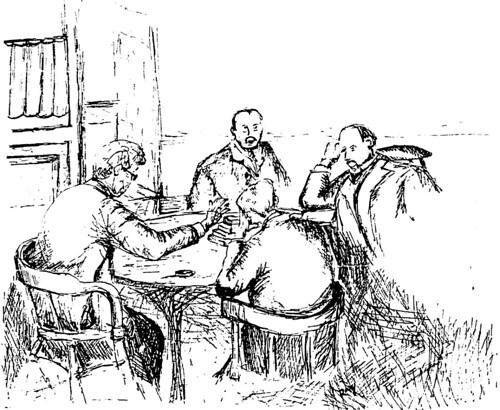The Skeptic's Credo
If you've ever read Goethe's theory of color, you'll know that there are often ideas that are beautiful, ingenious, and indubitably wrong.
Neither the scaffolding of an idea, the trimmings around a thought, nor its progenitor or credentialed bearer should disguise its essential worth even though any of the foregoing often do, indeed, mask the underlying truth. The bogus wear many disguises.
Both the most simple idea and the most arch concept can be praiseworthy, and fodder for much food for thought and insight, and yet both, the nigh-judious liminal thought and the complex, counterintuitive koan, can be completely and thoroughly mistaken.
We rightly treasure the insight of the boy who remarked that the Emperor "hasn't got anything on", injecting a dose of reality, but understand, all too well, the process that made the gathered multitude ignore the evidence of nude hubris on display in the fable. We live in our own fables.
Incidentally, I should note that Hans Christian Andersen didn't write the sequel about what happened to that little boy and his family six months later when The Authorities could finally deal with them after the wardrobe malfunction. Suffice to say that it wasn't pretty. My idle speculation is that he tipped off his contemporary, Dostoevsky, with the germ of Crime and Punishment - there's a PhD, or alternatively a Hollywood script, in fleshing out that crossover concept.
Suffice to say that the most brilliant of thinkers can turn into cranks of the grandest order when they step out of their lane. The shape of an idea may transcend borders figuratively but its core rarely strays far from home.
This is not to demean the polymath, or to prefer Isaiah Berlin's hedgehog to the roving fox, but merely an observation that critical thinking is always in order. The point is that delusions are not the province of the uneducated or uninformed. All ideas must thus be taken with a grain of salt and shown to relate to reality. If conception and perception must be married, let it be by wisdom.
The skeptic's credo is one of expectant ambivalence infused with an element of pessimism. Always mark your beliefs to market, you almost always hear the skeptic muttering, and with a touch of weary righteousness. The weariness comes from disappointment - an occupational hazard of skepticism, and the righteousness from the fraught history of one's confounding beliefs being proved right.
Scientists often claim to follow the skeptic's method, indeed their august Method - the one that they exhalt in their droning cocktail hour conversation, lends itself to the trappings of authority. The callouts to verifiability, testability and various isms are often worn as badges of invincibility even though they are mere cloaks of fallibility. Reason and inquiry, couched in specific forms lauded by the academy, are attributed the virtues of rigor and given free entry into society's discourse.
One need not go to Issac Newton, who would have sold you on his fever dream of the South Sea bubble, to pursue this point. Charles Darwin and the Brontë sisters would have talked you into spending your fortune on the Railway Manias of the mid 1800s. Even Charles Mackay, the man who wrote the book on Extraordinary Popular Delusions and the Madness of Crowds, himself fell prone to the similar mania. Gullibility is immortal. And the less said of the later, high-minded Victorian dabblers in phrenology and mesmerism - their parlor room séances speak for themselves, and were lampooned in real time. You've no doubt read their books. In our own time, the script may have changed but the servants of empire and of capital are still spouting their dismal wages.
As an engineer, albeit with a literary bent, I am well versed in our own idées fixes and can recite the STEM mantras as eloquently as others. For engineers too bring their blindspots to the table, substituting their programmatic interventions and sundry heuristics for intuitive common sense. The truth is, that peacock of our tribe, the self anointed tech visionary, is often just another blowhard, and should be judged (and ridiculed) accordingly.
The good books would guide us towards skepticism, and the oracles of all religions weigh in on credulity and inveigh against uncritical thinking and behavior. For Muhammed, the saying was "Trust in God but always tie up your camel at night". His earlier counterpart, the man from Nazareth, was a searching critic of authority on this earthly plane, and perhaps the fiercest advocate for performing due diligence in one's life. He would enjoin us to prepare for the kingdom of God and urge us towards the house on the rock (sidenote: perhaps the history of Christianity's spread betrays an inclination for mergers and acquistion, but I digress).
A difficulty with the parable of the wise and foolish builders is that it is all well for Jesus to advocate so incisively for building on solid foundations, but what if the home inspector assured you that the staged house you've just viewed, the one that was actually built on sand, was the real rock solid deal? In human affairs, who really has time for due diligence? And with Murdoch's real estate agent regaling you on the charming features of the McMansion, with Greenspan's Put Banker promising low interest rates come what may, the pressure is on to seal the deal, to stretch one's budget, and take on the liar loan. And this is not academic pedantry, the poor folks who lived in the Grenfell Tower had no reason not to trust the efficacy of the cladding, of all things, that wrapped what became their deathtrap. It is cold comfort to tell their ghosts that a house is not a home.
We are trusting simians not too far removed from the savanna and modernity makes us mostly morons in a hurry. It requires a lot of effort to be vigilant about the many Potemkins we face in life. We resort to heuristics and rules of thumb, and can be taking in by confidence artists of all sorts in the shell game of life. The gremlins and parasites of society prey on us and can easily turn the brightest of us into useful idiots.
If skepticism is the notion that that true knowledge is always uncertain, it simply imposes a frame on its bearer of always questionning, and this can be a wearying approach to life.
The early skeptic of most nostrums (capitalism, what have you) runs the risk of being branded as the designated driver: at once necessary for soul insurance and sober hindsight, but, frankly, buzzkill during humanity's weekend in Vegas. Aficionados of doubt are rarely celebrated by History, there is no cult of doubting Thomas.
Pyrrhonism, the total skepticism of yore, didn't have many adherents because its doctrine of radical skepticism proved immediately unpopular. While it was attempted as an all-encompassing philosophy of life, it has never prospered. It seems that some measure of faith, and, possibly, a considerable amount of that ineffable substance, is required in all human institutions that reproduce themeselves successfully.
It it the plight of the skeptic to forever inhabit the terrain of uncertainty, to vacillate in those borderlands of fate always on the verge of temptation by seductive manias.
The skeptical genes are obviously useful for humanity in our decision making but, paradoxically, they are not mandated, nor necessary, for our species's survival; they are certainly not under selective pressure to be chosen like a peacock's wing or our finely attuned eyesight. Accordingly, we see a wide spectrum of trust cultures around the world. In an era of ease or nostalgia, our propensity for skepticism may even fall prone to atrophy. Walter Bagehot, in Lombard Street, would remark that "All people are most credulous when they are most happy".
How then to hold on to one's skepticism when a bubble is in full flow when, as Keynes noted, "the market can remain irrational longer than you can remain insolvent". My own favorite reading reading comes from Andrew Odlyzko who offers a rich library on bubbles, gullibility and manias. Forewarned is forearmed. Dan Davies also gives insight on cultivating the skeptical inclination or, as he put it, Avoiding Projects Pursued By Morons 101. The selling of the second Iraq war remains an important case study. I fall back to that critical recommendation he makes about the vital importance of audit.
More classically perhaps, I harken to Diderot:
A thing is not proved just because no one has ever questioned it. What has never been gone into impartially has never been properly gone into. Hence skepticism is the first step toward truth. It must be applied generally, because it it the touchstone.The aphorists of yore prescribed a healthy dose of skepticism, and for good reason, but in their infinite wisdom, gave no guidance on the scale in question. It is lost in the veil of time the names of those who calibrated their formulae let alone their methodology. Further, their measuring sticks didn't have to contend with our fraught modernity. All too often, we only realize the appropriate measure of skepticism with hindsight and too late for optimal decision making. Fierce competitors they may be, I fear that the skeptics are doomed to run the race with a handicap. Ultimately, the tales the skeptics weave revolve around their conceptions of self, and they often live with the letdowns proffered by society and History. And so I remain a student of dissimulation and the strange architecture of misdirection. My fear is that the game is rigged, that we are all marks being cooled off. And the band played on.
To return to Goethe's notion referenced at the outset, pleasing as it may be to believe the "colors are the deeds and sufferings of light", I wouldn't make operational decisions based on that poetic insight. I have to hold fast to my inner skeptic and return to Hilaire Belloc on wishful thinking to give fortitude:
It is always a relief to believe what is pleasant, but it is more important to believe what is true.
This note is part of a series on Shell Games. See previously: Shame Cultures
Next: A Taxonomy of Useful IdiotsFile under: culture, observation, perception, skepticism, thinking, philosophy, best practices, human factors, zingers, aphorisms, shell game, Buyer's Remorse, Observers are worried, toli




No comments:
Post a Comment